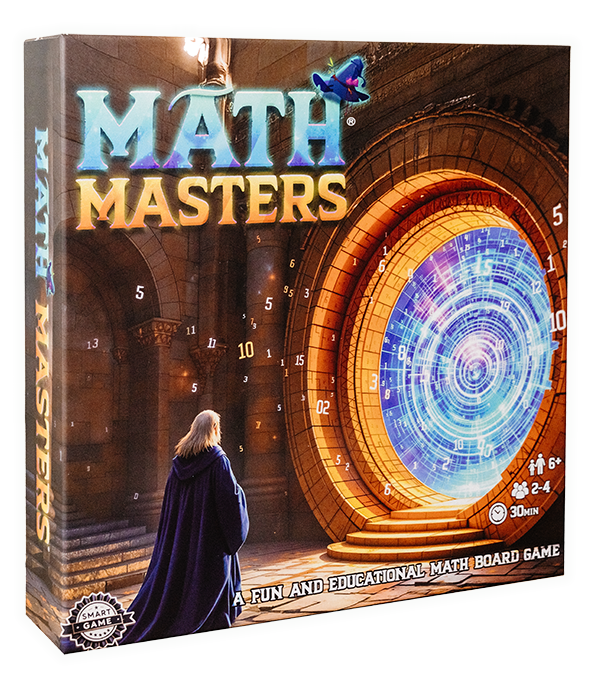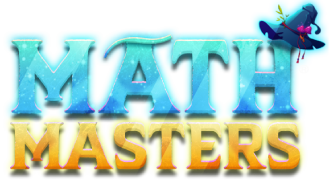Why math is important
Math is the foundation for learning, thinking and thriving
Math is much more than numbers on a worksheet. It’s a universal language. It’s a way of thinking that helps children make sense of the world around them.
When children learn math, they’re not just solving problems. They’re learning how to reason, how to think critically, how to compare, estimate, structure and plan. These are skills they will use every day in school, in work and in life.
From calculating prices in the supermarket, to understanding interest rates, or programming a computer, math is everywhere.
Roger Bacon was an English philosopher who lived in the 13th century said: “Mathematics is the gate and key of the sciences.” And even now, more than 700 years later, he’s absolutely right.
Here’s why:
In the magical world of Math Masters you become a student of the famous wizard Archimedo. Choose your character, learn to calculate like a master and discover your unique powers.
1. Math is the language of science
Whether it’s physics, biology, chemistry or economics, every science relies on math to explain
theories, make predictions and model systems.
For example:
• No space travel without algebra and calculus
• No medical studies without statistics
• No architecture without geometry
2. Math teaches logical thinking
Math trains us to think step by step, spot mistakes and support solutions with clear reasoning. These are the exact skills scientists need.
3. Math is universal
While language and culture may differ, math is always the same. An equation is understood the same way in Japan, the Netherlands or Brasil. That’s why Bacon called it a gate because math opens access to knowledge, everywhere.
4. Innovation is built on math
There would be no smartphones, internet, artificial intelligence or renewable energy without math. Every modern invention is built on decades (or centuries) of mathematical progress. This is why math is important!

Millions of children leave primary school without good math skills
Despite its importance, math is often the subject that children fear the most. Many students lose confidence early on, fall behind in class and never recover.
According to the TIMSS 2019 international study, only a third of children worldwide reach the High International Benchmark in math by the end of primary school. This means that over two thirds of children do not yet have the math skills needed to succeed in secondary or higher
education.
TIMSS 2019 – Average Math Scores (Grade 8)
(International average = 500)
These numbers show that even in high-income countries, many children struggle to reach expected
proficiency. In countries like Brazil and Argentina, the situation is even more urgent.
| Country | Score |
|---|---|
| Singapore | 616 |
| South Korea | 607 |
| Japan | 594 |
| Ireland | 524 |
| Poland | 516 |
| United States | 515 |
| Netherlands | 514 |
| Finland | 511 |
| Germany | 511 |
| United Kingdom | 507 |
| Country | Score |
|---|---|
| Spain | 502 |
| Norway | 501 |
| Czech Republic | 499 |
| Italy | 497 |
| Sweden | 491 |
| Portugal | 489 |
| France | 483 |
| Brazil | 400 |
| Argentina | 388 |

What happens when children become confident in math?
 Children with strong math skills tend to do better in science, reading and writing
Children with strong math skills tend to do better in science, reading and writing They are more likely to pursue higher education and careers in STEM (Science, Technology, Engineering, Mathematics)
They are more likely to pursue higher education and careers in STEM (Science, Technology, Engineering, Mathematics) They develop resilience and learn to approach challenges logically
They develop resilience and learn to approach challenges logicallyHow Math Masters helps change the story
We created Math Masters because we believe every child deserves the chance to enjoy math. Not just to pass the test but to actually enjoy solving problems, thinking strategically and making progress.
Math Masters is a fun and strategic math board game where players solve hundreds of mental math problems while racing to the finish. The gameplay disguises repetition as fun, and rewards focus, flexibility, and quick thinking.
Unlike workbooks or drills, Math Masters is:
 Game-based: Children stay engaged because they want to win
Game-based: Children stay engaged because they want to win Intellectually challenging: With different levels of difficulty and layers of strategy
Intellectually challenging: With different levels of difficulty and layers of strategy Social: Played together, encouraging collaboration and healthy competition
Social: Played together, encouraging collaboration and healthy competition Educational: Aligned with key math competencies for ages 6–14+
Educational: Aligned with key math competencies for ages 6–14+
A game with a mission
Across the globe, too many children fall behind in math at a young age. But it doesn’t have to be that way.
With the right approach, in a joyful, strategic and socially engaging way, children can rediscover the fun in learning. And once that switch is flipped, it stays with them for life.
Math Masters is our contribution to a world where every child can build their confidence in math, no matter where they live, what language they speak or how they’ve struggled before.
Join the movement
Whether you’re a parent, teacher, school or educational organization, your support helps us bring
Math Masters to classrooms, living rooms and communities around the world. Help us spread Math
Masters worldwide or make a donation so we can do our job.


